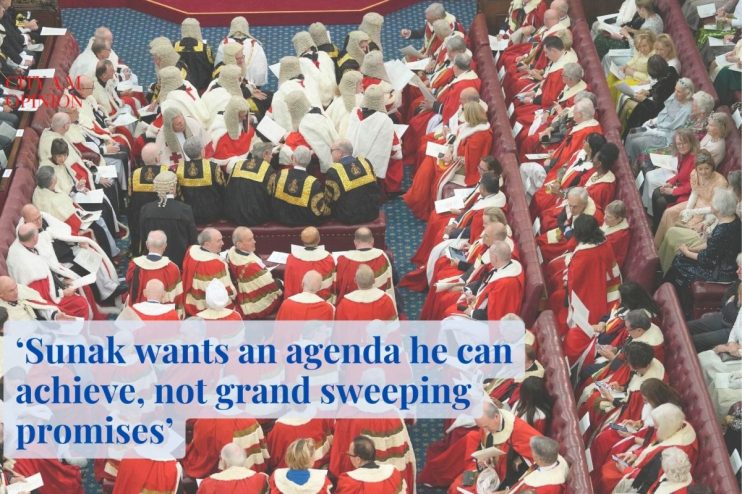King’s Speech: Compromise and deliverables for a target-driven Sunak

Yesterday was the first time Britain had a King’s Speech in 70 years. This fact may have been the only novelty about the agenda for the next session of Parliament, the last opportunity for Rishi Sunak to set out his plans before the next election.
It was largely a recap of what we already know: criminal sentencing, more licences in the North Sea, minimum services levels to prevent strikes, reform to the housing market and a football regulator, to name a few.
Noticeably, very few pushed the boundaries of what has already been extensively discussed by Sunak’s ministers.
For example, the Renters Reform Bill, which has caused huge headaches for renters, landlords, as well as Michael Gove, will have a final hurrah in Parliament. It aims to make it easier to purchase leaseholds, but stopped short of plans to phase them out altogether, while also giving renters more protections, without jeopardising landlords’ ability to “regain their property when needed”.
In other words, ifs and buts are an inbuilt mechanism. Charitable MPs (especially those who are landlords) would call this a compromise, others would call it unambitious.
Ditto for plans for education. Much had been made about replacing A-levels with a British Baccalaureate of some kind. Instead, we heard plans to crackdown on “low quality degrees” and replacing them with “high quality apprenticeships”.
On energy, where Sunak has insisted plans to allow new oil licences in the North Sea won’t affect our ability to hit net zero, there was a noticeable promise to ensure the UK “hold countries to account for their climate commitments”. It would be a tall order to lecture others on meeting green targets while pushing our own back.
There was a significant cultural leg, which has the promise of a good old dust up, with a piece of legislation, known as the Economic Activities of Public Bodies (Overseas Matters) Bill, which prevents public bodies from imposing their own boycotts or campaigns against foreign countries.
This will create significant tension in light of the Israel-Hams war, as local councils have made their politics clear. Earlier today, for example, Sheffield Council passed a motion calling for an Israeli ceasefire.
It could also mean a migraine for Keir Starmer, who is struggling to keep his party together over his continual support for Israel.
There were cursory mentions of artificial intelligence and “machine learning”, but little in the way of outright plans to bring in legislation on it in the UK. Perhaps a little battle weary from the Online Safety Bill, Sunak left the question of how we deal with this technology open.
If you’re a little bored of hearing about an impending election, read no further (or perhaps switch off for the next six to ten months). This King’s Speech may have had few pieces of red meat, but it tells us what the government think it can reasonably deliver on in the next Parliament. Sunak’s pitch as PM is as the one who can get things done, not a leader with grand, sweeping plans but no follow through. Compromise, then, is the watch-word for a man looking to hang onto the keys to Downing Street.
